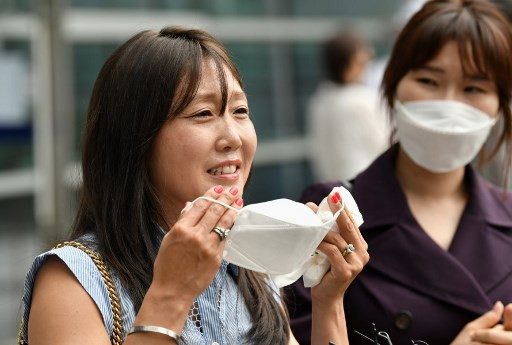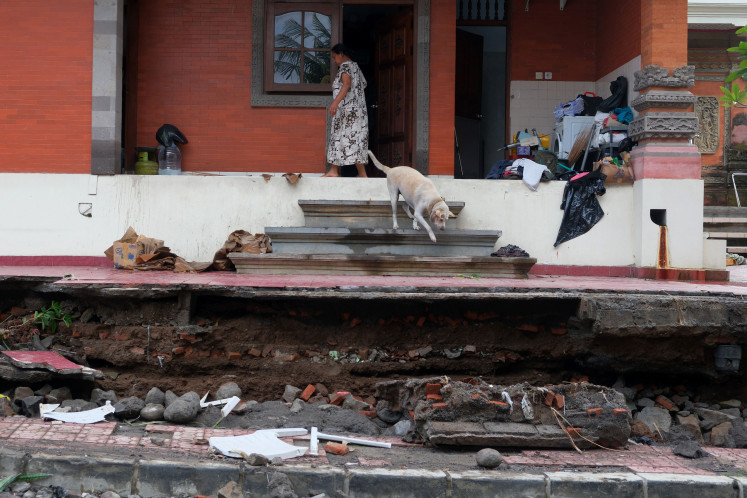Popular Reads
Top Results
Can't find what you're looking for?
View all search resultsPopular Reads
Top Results
Can't find what you're looking for?
View all search resultsWoman's search for birth parents leads to landmark S.Korea adoption ruling
The ruling is the first of its kind in South Korea, which Amnesty International once dubbed the "longest and largest supplier of international adoptees". It sets the stage for potentially thousands of other adoptees to be officially registered as children of their birth parents, with implications for inheritance and citizenship laws.
Change text size
Gift Premium Articles
to Anyone
 Korean adoptee Kara Bos (left), whose Korean name is Kang Mee Sook, speaks to the media after a ruling of her paternity suit at the Seoul Family Court in Seoul on June 12, 2020. - A Seoul family court on June 12 officially recognized a Korean-born adoptee as the daughter of her biological father, in a landmark case that could set a legal precedent. (AFP/Jung Yeon-je)
Korean adoptee Kara Bos (left), whose Korean name is Kang Mee Sook, speaks to the media after a ruling of her paternity suit at the Seoul Family Court in Seoul on June 12, 2020. - A Seoul family court on June 12 officially recognized a Korean-born adoptee as the daughter of her biological father, in a landmark case that could set a legal precedent. (AFP/Jung Yeon-je)
D
ecades after she was sent for adoption in the United States, Kara Bos’ quest to find her birth parents in South Korea moved a step closer on Friday when a Seoul court ruled that a South Korean man was her biological father.
The ruling is the first of its kind in South Korea, which Amnesty International once dubbed the "longest and largest supplier of international adoptees".
It sets the stage for potentially thousands of other adoptees to be officially registered as children of their birth parents, with implications for inheritance and citizenship laws.
While laws vary widely from country to country, many jurisdictions are providing more information to adopted children about their biological parents. Advocates say South Korea's policies remain relatively restrictive.
Bos, whose birth name is Kang Mee-sook, broke into tears as she left the courtroom. Removing a medical mask, she said in Korean: "Mom. Can you recognize my face? Please come to me."
Bos is one of more than 200,000 Korean children adopted overseas in the past 60 years, and her struggle to identify her parents highlights the challenges for many adoptees, said Rev. Do-hyun Kim, who heads KoRoot, a charity that works with adoptees.
"I think Kara’s journey, Kara’s fight, is meaningful because it reminds us that parents, society, and the state itself has public responsibility to clearly inform a child born in South Korean society about their roots," he said.
The ruling officially registers Bos as the child of a man who, according to a DNA test ordered by the court earlier this year, is 99.9981% likely her biological father.
That designation could entitle Bos to inheritance. The ruling could also lead to more adoptees with limited or no records to apply for South Korea citizenship, according to the Justice Ministry.
The man was identified only by his surname, with no contact details and Bos said the family wished to remain anonymous.
Bos said with the positive paternity test and the court ruling, the family finally agreed she could meet her father as soon as next week.
Long search for answers
In 1983, a two-year-old Bos was found abandoned in a market south of Seoul. Less than a year later, she was adopted by an American family.
Bos, who now lives in the Netherlands with her Dutch husband, knew from childhood she was adopted. Her search for her biological parents only began after the birth of her own daughter, who made Bos realize what it would mean to abandon a child at that age.
“At that point I realized that there is trauma involved in adoption, and it is much more complex than the saviour story," Bos said.
After several years of searching archives in South Korea, a break came in 2016 when a genealogy website matched her to a young South Korean man, whose grandfather was found to be Bos' biological father.
Bos said she took the case to court after exhausting all other ways of trying to speak to him and his family to find out about her mother.
“I even went to one of their houses and begged, literally, on my knees. And they called the police on me.”
Bos said she would not sign away any rights to inheritance but her primary goal was to speak to her father and eventually identify her mother.
“Without that legal help, I would still be in the dark,” Bos said. “I would still have no options.”









